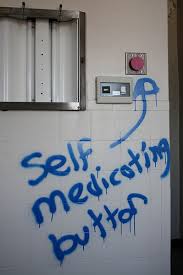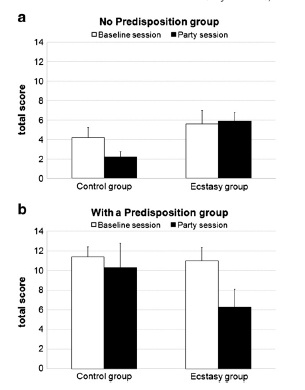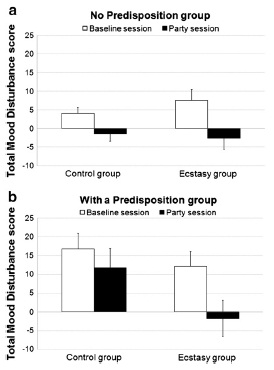Neuroscience

All participants were invited to attend a "party session" (and details about this are sketchy e.g. were they were all together - which could influence who does and doesn't decide to take the Es); and crucially, we assume they arrive with their own Es - however many?)
Participants were assigned to either the ecstasy or control group "based on their intention to consume a pill during the social gathering." The authors state "There was no encouragement to consume a pill for the purposes of the study. Subjects in the ecstasy group notified the investigator when they consumed a pill via text message, and 60min later the investigator administered the BDI and POMS by telephone and asked participants to provide a saliva sample in a plastic tube given to them prior to the party session."


- Why Exercise Helps Depression
Many studies have suggested exercise can help alleviate depression. Lynette Craft (Michigan State University) wanted to find out the psychological mechanisms that might underlie this benefit. Nine women with moderate depression underwent a nine-week exercise...
- "starving Is Just Like Ecstasy For Anorexics"...no!!
Say it isn't so! Gad, here's another sensationalistic headline to deconstruct: Starving is like ecstasy use for anorexia sufferers 09:00 02 October 2007 NewScientist.com news service Alison MotlukAnorexia and ecstasy use activate...
- Neuropsychology Abstract Of The Day: Donepezil, Mci, And Ad
Lu PH, Edland SD, Teng E, Tingus K, Petersen RC, Cummings JL & Alzheimer's Disease Cooperative Study Group. (2009) Donepezil delays progression to AD in MCI subjects with depressive symptoms. Neurology, 72(24):, 2115-2121. Departments of Neurology,...
- My Bloody Valentine: Cbt For Unmedicated Psychosis
When I critiqued Morrison et als exploratory CBT trial with people who stop taking anti-psychotic medication, I promised to write a post on the final study Well it appeared in the Lancet today and a free copy is here. I am not going to...
- Ecstasy ~ Russian Roulette With Your Memory
‘The general agreement that is emerging about ecstasy is that while you are using the drug, you might expect a very subtle memory impairment but it’s probably not significant in the real world ...[and] When you stop using it, as most people do,...
Neuroscience
Drug Buddy: Ecstasy to self-medicate depression?
This is not ecstasy, but it's better than cocaine.
and you know that I will miss you when you're gone
but I'm not equipped to play this game
The Czars (Drug)
and you know that I will miss you when you're gone
but I'm not equipped to play this game
The Czars (Drug)
Antidepressant‐like effects of ecstasy in subjects with a predisposition to depression
by Majumder, White & Irvine (in press) Addictive Behaviours
Majumder et al look at the topical and fascinating notion that people with a pre-existing mood disturbance may be using ecstasy as a ‘self-medication’. Given recent media reports about possibly using of MDMA to treat depression and the Channel 4 TV show Drugs Live: The Ecstasy Trial ...although presented by the media as looking at MDMA for depression, it seems to be more traumatic memories (but we haven't seen the show yet!)
does this short report of Majumder et al get us rolling...?
What did Majumder et al do? They compared the immediate effects of ecstasy on mood in subjects divided into those with (WP) and without (NP) a predisposition to depression (as assessed using the Brief Symptom Inventory: BSI) before and after a 'party'.
65% of the NP group were females, whereas in the WP group the male to female ratio was 2:1 (χ2(1)=4.912, p=0.027). The authors say "Other demographic parameters were similar between the groups [and]...No significant differences were observed between groups for ecstasy use or recent use of other substances (though details are missing)
65% of the NP group were females, whereas in the WP group the male to female ratio was 2:1 (χ2(1)=4.912, p=0.027). The authors say "Other demographic parameters were similar between the groups [and]...No significant differences were observed between groups for ecstasy use or recent use of other substances (though details are missing)
The Czars (Drug)
Method
The baseline session was scheduled when participants were drug free (confirmed by a urine test) for at least 7 days prior. All subjects were asked to fill out three self-assessment questionnaires: the Brief Symptom Inventory (BSI), the Beck Depression Inventory (BDI) and the Profile of Mood States (POMS).All participants were invited to attend a "party session" (and details about this are sketchy e.g. were they were all together - which could influence who does and doesn't decide to take the Es); and crucially, we assume they arrive with their own Es - however many?)
Participants were assigned to either the ecstasy or control group "based on their intention to consume a pill during the social gathering." The authors state "There was no encouragement to consume a pill for the purposes of the study. Subjects in the ecstasy group notified the investigator when they consumed a pill via text message, and 60min later the investigator administered the BDI and POMS by telephone and asked participants to provide a saliva sample in a plastic tube given to them prior to the party session."
The Lemonheads (My Drug Buddy)
Results
(All variance measures are SE). During the social gathering, the NP group reported consuming average of 1.7±0.33 pills, and those in the WP group 1.4±0.22 pills (not significantly different).
The mean MDMA concentration in saliva was 896±132.1 ng/ml (n=17). Crucially, again some detail is missing - they don't give MDMA concentration for the two separate groups, but for whole group. Urine screening tests the following day confirmed exposure to MDMA of subjects in the ecstasy group and did not detect MDMA in any of the control group samples. Other substances consumed were alcohol, cannabis and tobacco, but no difference was observed between the groups.
As expected, when drug-free, the WP subjects show greater mood disturbance and depressive symptoms than the NP group (POMS: NP 5.85±1.63, WP 14.5±2.81, p<0.05, BDI: NP 4.9±0.86, WP 11.2±1.65, p<0.01). Turning to the main reuslts:
Beck Depression Inventory (BDI) The authors report that "During social gathering, WP subjects who consumed ecstasy reported a significant decrease in depressive symptoms (F(1,35)=5.47, p<0.05). We can see this reduction in bottom figure (b).
However, the authors fail to say anything about the top left figure (a) - where the No Predisposition group show far greater depression (BDI scores) than controls after taking ecstasy - this looks, if anything, a larger difference than the purported reduction (after E); and even a reduction in depression symptoms for the controls themselves who don't take E (which seems as quite large given the small SE bars)

Profile of Mood States (POMS)
POMS: No significant effect of E on mood emerged. The authors state "No interaction or main effects of the drug group and predisposition to depression scores at the party session were observed."
This seems slightly odd given that every group showed a reduction of POMS scores (see Figure below) whether they had predispotion or not, took E or not!

Conclusions
The authors conclude "A decrease in depressive symptoms was observed in subjects predisposed to depression. This antidepressant-like action of MDMA may contribute to its use, particularly among people with an existing or latent depressive disorder."
To me it seems a few questions remain:
1) Did the participants take E together? what are the consequences of social desirability and bravado?
2) Why was the MDMA concentration not given for separate groups (WP and NP) who took E? This is important information as we dont know what the WP and NP groups took
3) Did the BDI scores of controls decrease significantly in the NP condition?
4) In the NP condition, do the E users show significantly greater BDI scores than controls at the party?
5) If BDI does decrease, why is POMS left unaffected? or is it unaffected given all groups show a reduction, why is the main effect for before and after party not sigificant (possibly a lack of power?)
- Why Exercise Helps Depression
Many studies have suggested exercise can help alleviate depression. Lynette Craft (Michigan State University) wanted to find out the psychological mechanisms that might underlie this benefit. Nine women with moderate depression underwent a nine-week exercise...
- "starving Is Just Like Ecstasy For Anorexics"...no!!
Say it isn't so! Gad, here's another sensationalistic headline to deconstruct: Starving is like ecstasy use for anorexia sufferers 09:00 02 October 2007 NewScientist.com news service Alison MotlukAnorexia and ecstasy use activate...
- Neuropsychology Abstract Of The Day: Donepezil, Mci, And Ad
Lu PH, Edland SD, Teng E, Tingus K, Petersen RC, Cummings JL & Alzheimer's Disease Cooperative Study Group. (2009) Donepezil delays progression to AD in MCI subjects with depressive symptoms. Neurology, 72(24):, 2115-2121. Departments of Neurology,...
- My Bloody Valentine: Cbt For Unmedicated Psychosis
When I critiqued Morrison et als exploratory CBT trial with people who stop taking anti-psychotic medication, I promised to write a post on the final study Well it appeared in the Lancet today and a free copy is here. I am not going to...
- Ecstasy ~ Russian Roulette With Your Memory
‘The general agreement that is emerging about ecstasy is that while you are using the drug, you might expect a very subtle memory impairment but it’s probably not significant in the real world ...[and] When you stop using it, as most people do,...
